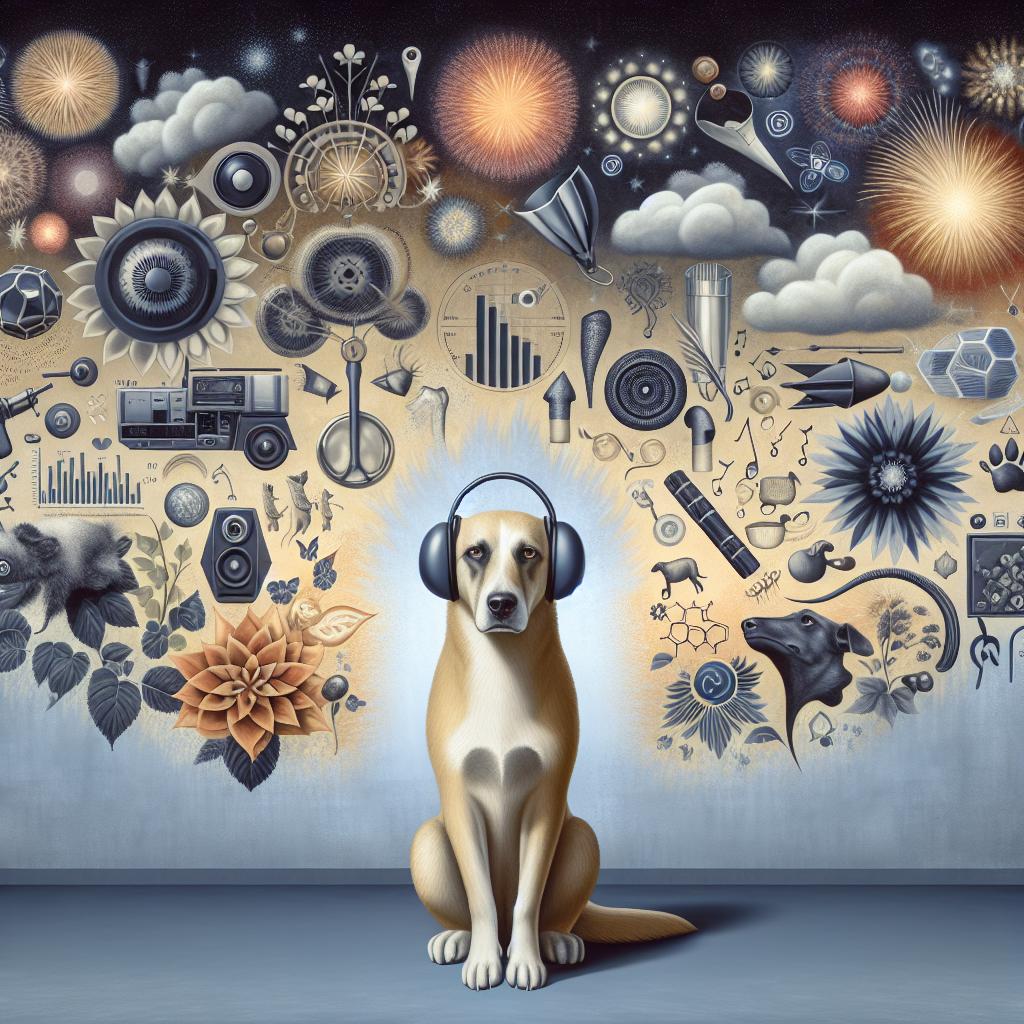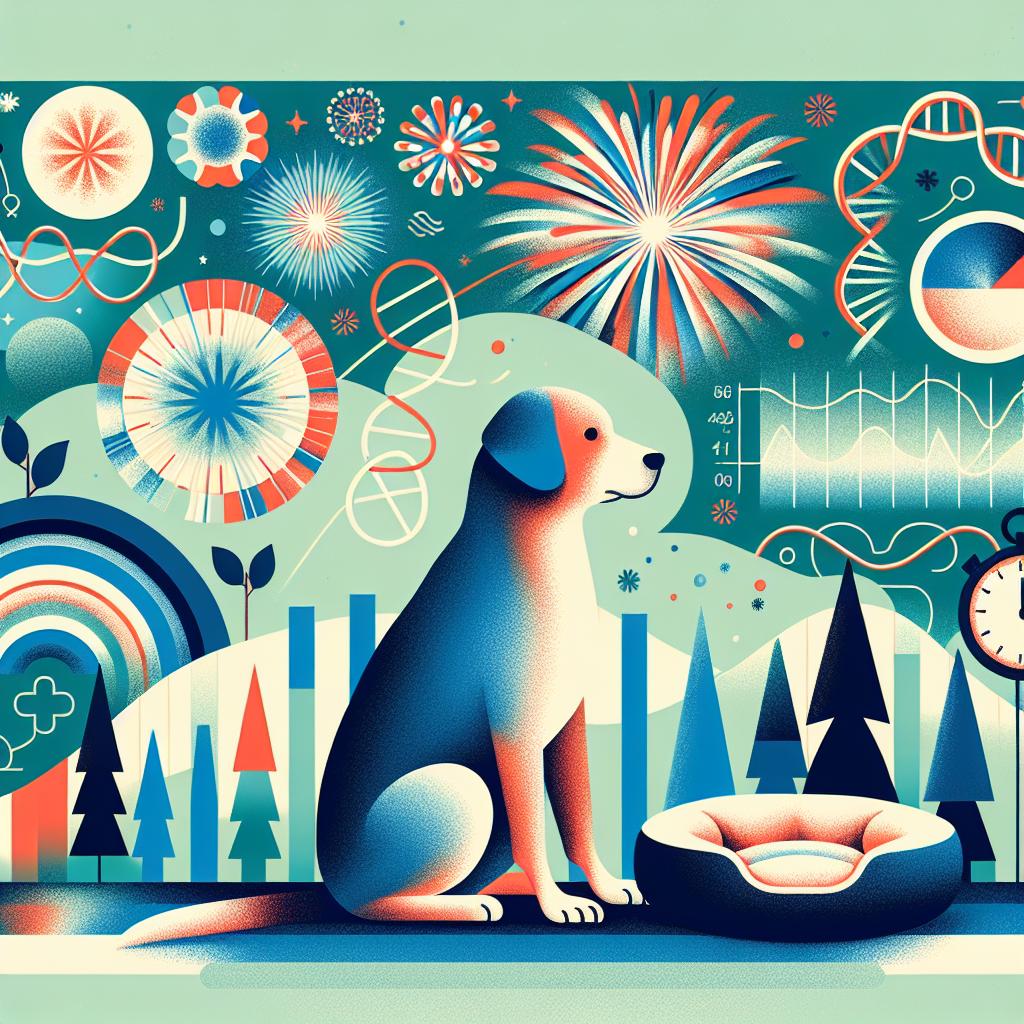As the skies light up with vibrant bursts of color and the air fills with the exhilarating sounds of celebration, many pet owners anticipate both the joy of fireworks and the anxiety of their furry companions. For countless dogs, the booming explosions and crackling noises turn a festive occasion into a source of distress. While the spectacle may enchant human eyes, the fear it instills in our canine friends often leaves us searching for ways to provide comfort and reassurance. In this article, we will explore effective strategies to train your dog to remain calm during fireworks, helping you create a peaceful environment for your dog while still enjoying the magic of the holiday season. By employing patience, understanding, and some tried-and-true techniques, you can transform your pet’s response to fireworks from fear to tranquility.
Understanding Your Dogs Fear of Fireworks
Many dogs experience anxiety and fear during fireworks due to their sensitive hearing and the suddenness of the loud noises. Understanding that dogs perceive the world differently can help pet owners empathize with their furry friends. They might associate the booming sounds with danger or feel overwhelmed by the vibrations and flashes of light, which can trigger their instinctual fight-or-flight response. Recognizing these signs of distress is crucial in helping them cope with such situations.
To assist your dog in overcoming their fear of fireworks, consider implementing the following strategies:
- Safe Space: Create a comfortable area in your home where your dog can retreat during fireworks. Stuff it with familiar blankets and toys to create a sense of security.
- Desensitization: Gradually introduce your dog to recorded sounds of fireworks at low volumes while providing positive reinforcement and treats to create a positive association.
- Calming Aids: Consider using anxiety wraps or pheromone diffusers that can help soothe your dog during stressful times.

Preparing Your Dog for Fireworks Season
As firework season approaches, it’s essential to create a safe and reassuring environment for your dog. Start by designating a cozy indoor space where your dog feels secure. This could be a quiet room with their favorite bed, toys, and a blanket. To further ease anxiety, consider using sound-dampening materials such as thick curtains or blankets to muffle the noise from outside. Familiar scents, such as a worn t-shirt or a soft toy, can help comfort your dog during this stressful time. Gradually associating the area with positive experiences, like treats or playtime, can make it a haven for your furry friend during the chaos of fireworks.
In addition to creating a comfortable space, initiating desensitization training is essential. Begin by playing recordings of fireworks sounds at a low volume while engaging your dog in activities they love, such as fetch, or rewarding them with treats. Over time, gradually increase the volume while maintaining a positive atmosphere. You can follow these steps to prepare your dog:
| Step | Activity | Goal |
|---|---|---|
| 1 | Set up a safe zone | Provide comfort |
| 2 | Play firework sounds | Desensitize |
| 3 | Reward calm behavior | Encourage relaxation |
Lastly, consider consulting with your veterinarian if anxiety persists or if your dog has severe reactions. They may suggest calming supplements or even behavioral therapy to help ease your dog’s stress during the fireworks season. Remember, with patience and preparation, your dog can learn to feel safe and secure even in the midst of noise and excitement.
Techniques to Calm Your Dog During Fireworks
To help your furry friend cope with the anxiety caused by the loud booms and flashes of fireworks, consider implementing a variety of calming techniques. One effective method is creating a safe haven within your home. Designate a quiet, cozy space where your dog can retreat during fireworks displays. This area can include their bed, blankets, and favorite toys. You might want to use soundproofing materials, such as heavy curtains, to muffle the noise. Additionally, you can play soothing music or use a white noise machine to help mask the sounds of fireworks.
Another approach is to introduce your dog to calming aids such as anxiety wraps, pheromone diffusers, or herbal supplements specifically designed for pets. These products can provide additional comfort during stressful situations. Consider also engaging in positive reinforcement training techniques, where you reward your dog with treats and praise for calm behavior during periods of loud noises. Lastly, familiarize your pet with these techniques well in advance; practice during lesser distractions to establish a sense of security, making the training process smoother when the fireworks start.

Creating a Safe Haven for Your Dog
Establishing a nurturing environment for your dog during stressful events such as fireworks is essential for their well-being. Start by designating a quiet space in your home where your pet can retreat when the noise begins. This area should be familiar and filled with comfortable bedding, favorite toys, and perhaps a piece of your clothing to provide a sense of security. Ensure this haven is away from windows and doors to minimize the sound and visual distractions from outside.
To further enhance this safe zone, consider incorporating soothing elements. Play soft music or use white noise machines to drown out the sound of fireworks. You might also explore calming products such as pheromone diffusers or anxiety wraps that can help your dog feel more at ease. Regular visits to this space, even during calm periods, will help your dog associate it with positive experiences. Remember, consistency and comfort are key to ensuring your furry friend feels safe and secure during those disruptive fireworks displays.
Q&A
Q&A: How to Train Your Dog to Be Calm During Fireworks
Q: Why do some dogs react negatively to fireworks?
A: Dogs have sensitive hearing and can perceive sounds at frequencies much higher than humans. Fireworks produce loud, unpredictable sounds that can be startling and frightening for your furry friend, often triggering anxiety or stress.
Q: When should I start training my dog to be calm during fireworks?
A: It’s best to start training well in advance of firework season. Begin at least a few weeks or even months before anticipated noise events to gradually desensitize your dog to loud noises in a controlled way.
Q: What techniques can I use to help my dog become desensitized to fireworks?
A: Techniques include gradual exposure to recorded sounds of fireworks at a low volume while providing positive reinforcement, like treats and praise. Over time, you can gradually increase the volume as your dog becomes more comfortable.
Q: Can I use any products or tools to help my dog with fireworks anxiety?
A: Yes! Consider using anxiety wraps, calming treats, or pheromone diffusers specifically designed to ease anxiety. Additionally, consult your veterinarian about possible medications that may help your dog cope during particularly loud events.
Q: What should I do if my dog shows signs of distress during fireworks?
A: First, try to create a safe and comforting environment for your dog. Use their crate or a quiet room, and provide comforting items like their favorite toys or blankets. Stay calm yourself, as dogs can sense their owner’s emotions. Engage them in a favorite game or activity to distract from the noise.
Q: Is it beneficial to socialize my dog in environments with loud noises?
A: Yes! Gradual exposure to various loud sounds in controlled environments helps desensitize your dog. Bring them to places with background sounds (like parties with music or busy streets) to help them learn to remain calm amidst noise.
Q: Can regular exercise help with my dog’s anxiety during fireworks?
A: Absolutely! Regular exercise can significantly reduce anxiety levels in dogs. A long walk or vigorous play session before fireworks start can help expend excess energy and create a calmer mindset.
Q: What role does positive reinforcement play in this training?
A: Positive reinforcement is crucial! Rewarding your dog for calm behavior during training sessions conditions them to associate loud noises with positive outcomes, promoting calmness over fear.
Q: If my dog has severe anxiety, when should I consider seeking professional help?
A: If your dog exhibits severe anxiety or aggression during fireworks, it’s a good idea to consult a professional dog trainer or a veterinarian who specializes in behavior. They can guide you through tailored strategies and, if necessary, discuss medication options.
Q: What are some additional things I should avoid when my dog is fearful of fireworks?
A: Avoid scolding or punishing your dog for their fear, as this can exacerbate anxiety. Also, refrain from overcomforting them excessively during the event, as this might reinforce the idea that there is something to be scared of.
Conclusion
Fireworks can be a challenging time for many dog owners, but with patience, training, and the right strategies, you can help your furry friend feel safe and relaxed. Remember, every dog is unique, so tailor your approach to suit your pet’s specific needs!
The Conclusion
As the final echoes of fireworks dissipate into the night sky, the importance of a calm and composed canine companion becomes all the more apparent. By equipping yourself with the right tools, techniques, and a touch of patience, you can transform your pup’s fireworks fear into a manageable experience. Remember, the journey to a serene response involves understanding, consistency, and love. With each spark and bang, you have the opportunity to reinforce a sense of safety and security for your dog. So, as you gear up for next year’s festivities, reflect on the methods that resonate with you and your furry friend. Together, you’ll be ready to embrace the celebration with confidence—and a lot less barking. Here’s to peaceful nights, even amidst the brightest displays!

